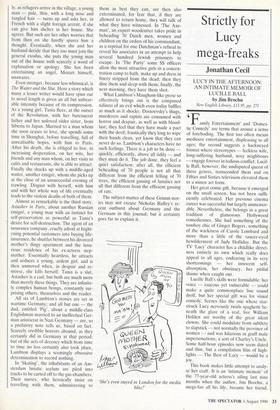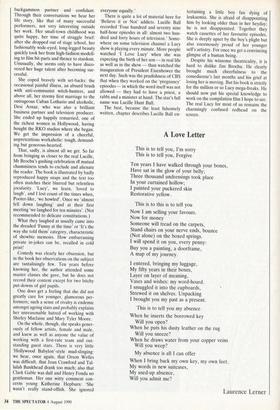Strictly for Lucy mega-freaks
Jonathan Cecil
LUCY IN THE AFTERNOON: AN INTIMATE MEMOIR OF LUCILLE BALL by Jim Brochu
New English Library, £13.95, pp. 271
tic Comedy' are terms that arouse a sense of foreboding. The first too often means mediocre entertainment, displeasing to all ages; the second suggests a hackneyed format where stereotypes — feckless wife, long-suffering husband, nosy neighbours — engage forever in tedious conflict. Lucil- le Ball, however, the undisputed queen of these genres, transcended them and on Fifties and Sixties television elevated them to a minor art form.
Her great comic gift, because it emerged on the small screen, has not been suffi- ciently celebrated. Her previous cinema career was successful but largely unmemor- able. Nevertheless, she belongs in a great tradition of glamorous Hollywood comediennes. She had something of the tomboy chic of Ginger Rogers, something of the wackiness of Carole Lombard and more than a little of the saucer-eyed bewilderment of Judy Holliday. But the TV 'Lucy' character has a childlike direct-
ness entirely its own which really does appeal to all ages, endearing in its very shortcomings — her innocent self- absorption, her obstinacy, her pitiful shame when caught out.
Lucille Ball's skills were formidable: her voice — raucous yet vulnerable — could
make a quite commonplace line sound droll, but her special gift was for visual comedy. Scenes like the one where star- struck Lucy nervously twirls spaghetti be- neath the glare of a real, live William Holden are worthy of the great silent clowns. She could modulate from subtlety to slapstick — not normally the province of women — and was hilarious in gruff male impersonations; a sort of Charley's Uncle. Some half-hour episodes now seem dated and thin, but a compilation film of high- lights — The Best of Lucy — would be a joy.
This book makes little attempt to analy- se her craft. It is an 'intimate memoir' of the 77-year-old actress's ailing last nine months when the author, Jim Brochu, a mega-fan all his life, became her friend, backgammon partner and confidant. Through their conversations we hear her life story, like that of many successful performers, not very interesting outside her work. Her small-town childhood was quite happy, her time of struggle brief: after she dropped out of stage school, her fashionably wide-eyed, long:legged beauty quickly took her from high-fashion modell- ing to film bit-parts and thence to stardom. Unusually, she seems only to have disco- vered her huge talent after becoming suc- cessful.
She coped bravely with set-backs: the occasional painful illness, an absurd brush with anti-communist witch-hunters, and above all, her stormy first marriage to the outrageous Cuban Lothario and alcoholic, Desi Arnaz, who was also a brilliant business partner and television producer. She ended up happily remarried, one of the richest women in Hollywood, having bought the RKO studios where she began. We get the impression of a cheerful, unpretentious workaholic: tough, demand- ing but generous-hearted.
That, sadly, is almost all we get. So far from bringing us closer to the real Lucille, Mr Brochu's gushing celebration ol mutual chumminess tends to exclude and alienate the reader. The book is illustrated by badly reproduced happy snaps and the text too often matches their blurred but relentless jocularity. 'Lucy', we learn, 'loved to laugh', and I lost count of the times when, Pooter-like, 'we howled'. Once we 'almost fell down laughing' and at their first meeting 'we laughed for ten minutes'. (Not recommended to delicate constitutions.) What they laughed at usually came into the dreaded 'Funny at the time' or 'It's the way she told them' category, characteristic of showbiz memoirs. How embarrassing private in-jokes can be, recalled in cold print!
Comedy was clearly her obsession, but in the book her observations on the subject are tantalisingly few. Ten years before knowing her, the author attended some master classes she gave, but he does not record their content except for two bitchy put-downs of girl pupils.
One does get a feeling that she did not greatly care for younger, glamorous per- formers; such a sense of rivalry is endemic amongst ageing stars and probably explains her unreasonable hatred of working with Shirley Maclaine and Mary Tyler Moore.
On the whole, though, she speaks gener- ously of fellow artists, female and male, and knew as well as anyone the value of working with a first-rate team and out- standing guest stars. There is very little 'Hollywood Babylon'-style mud-slinging: we hear, once again, that Orson Welles was difficult, that Joan Crawford and Tal- lulah Bankhead drank too much; also that Clark Gable was dull and Henry Fonda no gentleman. Her one witty comment con- cerns young Katherine Hepburn: 'She wasn't really stand-offish. She ignored everyone equally.'
There is quite a lot of material here for 'Believe it or Not' addicts. Lucille Ball recorded 'Four hundred and seventy nine half-hour episodes in all: almost two hun- dred and forty hours of television.' Some- where on some television channel a Lucy show is playing every minute. More people watched 'I Love Lucy' when she was expecting the birth of her son — in real life as well as in the show — than watched the inauguration of President Eisenhower the next day. Such was the prudishness of CBS that when they worked on the 'pregnancy' episodes — in which the word itself was not allowed — they had to have a priest, a rabbi and a minister at hand. The star's full name was Lucille Hunt Ball.
The best, because the least fulsomely written, chapter describes Lucille Ball en- tertaining a little boy fan dying of leukaemia. She is afraid of disappointing him by looking older than in her heyday; he is not disappointed. Together they watch cassettes of her favourite episodes. She is deeply upset by the boy's plight but also enormously proud of her younger self's artistry. For once we get a convincing glimpse of a human being.
Despite his winsome theatricality, it is hard to dislike Jim Brochu. He clearly brought much cheerfulness to the comedienne's last months and his grief at losing her is moving. But his book is strictly for the million or so Lucy mega-freaks. He should now put his special knowledge to work on the compilation film I hope to see. The real Lucy for most of us remains the charmingly confused redhead on the screen.

















































 Previous page
Previous page